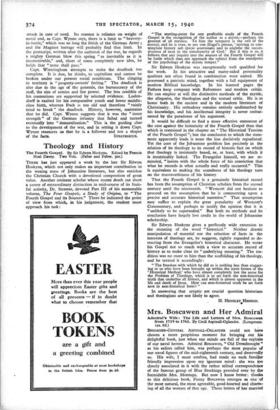Theology and History
THERE has just appeared a work by the late Sir Edwyn Hoskyns, which not only makes an important contribution to the waxing mass of Johannine literature, but also enriches the Christian Church with a devotional composition of great value. Another eminent scholar whose recent death cut short a career of extraordinary distinction in mid-course of its fruit- ful activity, Dr. Streeter, devoted Part III of his memorable volume, The Four Gospels, a Study of Origins, to "The Fourth Gospel and its Sources." There he indicated the point of view from which, in his judgement, the student must approach his task:
"The starting-point for any profitable study of the Fourth Gospel is the recognition of the author as a mystic—perhaps the greatest of all mystics. To him the temporal is the veil of the eternal, and he is ever, to use von Hiigel's phrase, ' striving to con- template history sub specie aeternitans and to englobe the succes- siveness of man in the simultaneity of God.' But if this is so, it follows that any inquiry into the sources of the Fourth Gospel will be futile which does not approach the subject from the standpoint of the psychology of the mystic temper."
Sir Edwyn Hoskyns was exceptionally well qualified for the work. In his attractive and many-sided personality qualities not often found in combination were united. He possessed a patristic mind, together with a full equipment of modern Biblical knowledge. In his learned pages the Fathers keep company with Reformers and modern critics.
He can employ at will the distinctive methods of the mystic, the allegorist, the theologian and the textual critic. He is at home both in the ancient and in the modem literature of Christianity. His orthodoxy remains entirely undisturbed by his knowledge, and his intellectual integrity is never embar- rassed by the paradoxes of his argument.
It would be difficult to find a more effective statement of the case against the historicity of the Fourth Gospel than that which is contained in the chapter on " The Historical Tension of the Fourth Gospel "; but the conclusion to which the state- ment apparently leads is none the less decisively repudiated. Yet the core of the Johannine problem lies precisely in the relation of its theology to its record of historic fact on which that theology is insistently based, or, at least, with which it is inextricably linked. The Evangelist himself, we are re- minded, " insists with the whole force of his conviction that what he records is what actually and really occurred." This is equivalent to making the soundness of his theology turn on the trustworthiness of his history.
That the Fourth Gospel is a genuinely historical record has been the assumption of Christian scholars from the second century until the nineteenth. " Westcott did not hesitate to proceed on the assumption that he is commenting upon a precise and accurate historical narrative." That assumption may suffice to explain the great popularity of Westcott's Commentary, and perhaps to justify the opinion that it 'is " unlikely to be superseded." But both its methods and its conclusion have largely lost credit in the world of Johannine scholarship.
Sir Edwyn Hoskyns gives a perilously wide extension to the meaning of the word " historical." Neither drastic manipulation of material nor the selection of facts in the interests of theology are, he suggests, rightly regarded as de- tracting from the Evangelist's historical character. He wrote his Gospel not so much with a view to accurate record of history as to make clear its "underlying meaning." The tra- dition was no more to him than the scaffolding of his theology, and he treated it accordingly : " The freedom with which he did so is nothing less than stagger- ing to us who have been brought up within the strait fetters of the ' Historical Method,' who have almost completely lost the sense for the Problem of Theology, which is to set forth the non-historical truth that underlies all history, and which is almost apparent in the life and death of Jesus. How can non-historical truth be set forth save in non-historical form? "
In answering that cryptic yet crucial question historians and theologians are not likely to agree.
H. HENSLEYoHENSON.






















































 Previous page
Previous page